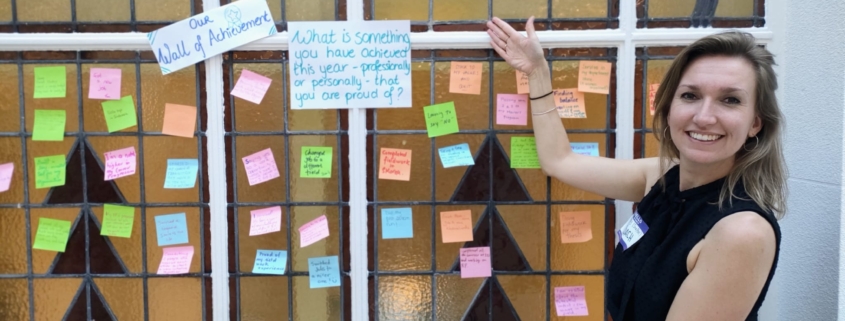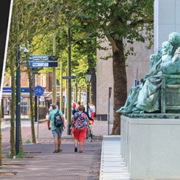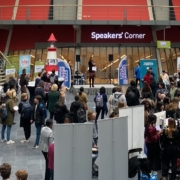Effective Facilitation as a Key Ingredient for Social Impact
We spoke with long-time Hub member and friend Kelly Indira Buis about her work on adaptation processes and upcoming Facilitation Workshop. She shared her observations that in a world as dynamic and changing as ours, the ability to adapt and facilitate the dialogue needed for this is indispensable. This is especially true within the social impact sector.
Read our interview below to learn more about Kelly and how she is equipping professionals in this field with these essential facilitation skills.
What made you interested in facilitation and the work you do now?
I have always been fascinated by how people interact. So, when analysing conflicts for my major in Conflict Studies, I was particularly interested in how people in war-torn communities and societies are able to live together again after a conflict. This question brought me to Lebanon in 2016.
While observing several post-conflict peacebuilding and reconciliation initiatives across the country for my research, I watched various facilitators guide these important but often tense conversations. I was mesmerised by their ability to bring individuals and communities closer in these challenging circumstances, even in an environment of political apathy and societal segregation.
That was the moment I not only realised the importance of facilitation but also hoped that one day I could do something similar in a context I knew well.
Fast forward to 2023, and I am doing exactly that. I support organisations and teams in the social impact sector as a facilitator, project and programme manager, and advisor throughout their adaptation process.
What I enjoy most about what I do is bringing people together and facilitating the process in such a way that the team can come up with the solutions they need by using their collective knowledge. That leads to magical moments.
What is the story behind the name The Adaptation Company?
I have chosen the name The Adaptation Company because if there’s one certainty in life, it is that we live in a constantly changing world. That means we need to constantly adapt, change, and realign our work. From the design, approach, tools, and methods we use to the people involved in the process.
With that in mind, I don’t think linear, fixed plans and proposals will get us to where we need to be, even though that is often the way we are taught to do the work. Instead, I believe an adaptive approach is far more likely to be of value.
One way to ensure we can adapt to these changing needs and circumstances in our projects and programmes is through effective facilitation. This allows us to guide the collaboration and conversations that are needed to find solutions to the complex issues we are working on.
You are co-designing a facilitation course for social impact professionals at the moment. Can you tell us more about it?
Whether it’s in our official job title or not, the moment we bring people together, we are facilitating. And to make the most of our time together, a well-designed and intentionally facilitated gathering is essential.
Fortunately, I am increasingly seeing value being attached to facilitation as an essential skill to develop regardless of our official roles.
That’s why Jeroen Blijsie, the founder of The Visual Connection, and I decided to launch a course on facilitation specifically designed and tailored to the needs of those working in the social impact sector.
It is all about designing the right approach to a gathering, creating a safe space for creativity and dialogue, and leading groups in and through different situations and complex discussions. All while staying true to your own style as a facilitator.
What makes this course unique?
Immersive, practical, and full of creative working methods are key words to describe our approach. Essentially, it is the course I wish was out there when I took my first steps in the social impact sector in order to lead groups to shared results.
It allows you to discover or refine your facilitation style, get more confident in front of the group, and design group processes like a pro while adding countless new working methods to your toolkit.
It is also a great opportunity to get in touch with professionals from other organisations in the social impact sector, network, and go on this learning journey together.
In your view, what is the future of facilitation in the social impact sector?
With the time, resource, and energy constraints that we face, I have observed people valuing facilitation skills as a success factor for getting unstuck, making progress, and delivering the work.
Luckily, intentionally designing and facilitating processes is something that is achievable for us all if we invest time to reflect on our approach and style, acquire the tools, and practise our facilitation skills.
Through the course, we provide that reflection and learning space all tailored to the practical cases the participants bring in.
So whether you want to get more confident in front of different groups, learn how to design engaging meetings that lead to results, or get more comfortable with guiding gatherings with a wide range of (international) stakeholders who each have their own interests and opinions – this five-day learning journey in the winter of 2023-2024 covers it all.
Interested and want to learn more? Visit this page or watch this video in which Jeroen and Kelly explain the course, its aims, and whom it is for!









